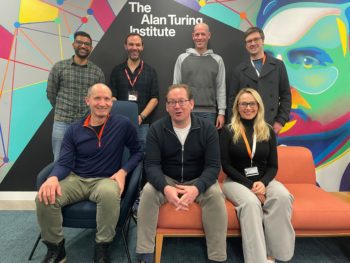News – Blog
Meet the team: Quartz Solar AI Nowcasting (17/09/24)
September 17, 2024
Meet the team behind Quartz Solar, an AI-powered cloud forecasting approach to support our transition to renewable energy – made up of non-profit product lab Open Climate Fix working together with a team at The Alan Turing Institute.
Solar power is an essential part of the UK’s energy mix, providing a sustainable and clean source of electricity that enhances both our energy security and our climate goals. Solar power generation is growing exponentially and is forecast to be the largest form of electricity generation capacity globally by 2040.
With this vast potential, however, comes an element of unpredictability: the weather. Solar panels generate far less electricity when a cloud moves overhead, making energy output uncertain and difficult to predict. This uncertainty comes at a cost of millions of pounds and hundreds of thousands of tonnes of CO2 in the UK alone, as back-up fossil fuels are needed to bridge the gap in electricity demand. Forecasting solar energy generation is vital to maximise the efficiency of this power source.
What if we could more accurately predict future cloud cover, allowing solar energy to be more efficiently integrated into the electricity grid?
Current AI solar generation models assimilate multiple weather forecasts; however, traditional weather forecasts have limitations. Firstly, they focus primarily on wind and temperature prediction, making clouds particularly difficult to predict at the fine scale required. Secondly, traditional weather models take hours to run on massive supercomputers, meaning they are out of date as soon as they are produced. Running the electricity grid efficiently would require accurate predictions hours or even minutes ahead of time, helping to inform key decisions, such as when to turn on back-up fossil-fuel generation.
“In the coming years, optimising and forecasting the use of renewable energy is going to be crucial to ensure that our management of these vital energy sources is efficient and helps the UK decarbonise faster.” – Marc Deisenroth, Director of Science and Innovation (Environment and Sustainability) at The Alan Turing Institute
Predicting the future
For the last two years, Open Climate Fix has been forecasting solar energy generation in the control room of the UK’s National Grid, helping their engineers balance the grid and save cost and carbon. Open Climate Fix researchers have incorporated satellite imagery of clouds from up to an hour in the past into their AI model, which reduced the errors in forecasts by 15-20%.
However, a more desirable solution would be to predict future cloud cover rather than using only past cloud information from satellite data. In this endeavour, Open Climate Fix has now joined forces with The Alan Turing Institute to launch Quartz Solar AI Nowcasting, a project which aims to predict cloud movements up to four hours ahead.
This involves using powerful AI to analyse vast amounts of historical satellite imagery and weather data to identify patterns of cloud movement and evolution. This brings greater precision, speed and power in cloud predictions to support existing solar generation forecasts. The result is the ability to run forecasts fast enough to work in an operational environment within minutes, rather than the hours typically taken by traditional weather forecast models.
Greater accuracy will bring a range of benefits. Better forecasts will help manage the energy grid, cutting down the UK’s need for back-up power, reducing costs and ensuring a steady supply of renewable energy for our homes and businesses. This more efficient use of renewables like solar means lower emissions, helping the UK hit carbon reduction targets, reduce air pollution and mitigate climate change.
It’s not just solar farms and energy grids that could benefit. Forecasting cloud cover can help in many other ways, from improving flood warnings to helping people plan sun exposure into their day to reduce health conditions like seasonal affective disorder or low vitamin D.
Crucially, this initiative is scalable and, if successful, would allow Open Climate Fix to produce a cloud forecast for anywhere in the world, with the potential to save tens of mega-tonnes of carbon emissions.
“We’re delighted to be working with Open Climate Fix on this project as it aligns with our aim to use AI and data science to tackle the most pressing societal issues.” – Marc Deisenroth, Director of Science and Innovation (Environment and Sustainability) at The Alan Turing Institute
The Quartz Solar AI Nowcasting team are excited about the potential of AI to maximise renewables. Ongoing research will explore the application of these approaches to other renewable energy sources, such as wind power.
Partnerships are key to their success, and by maximising the reach of the Alan Turing Institute and Open Climate Fix, they hope to mobilise academia, industry and government to advance the technology further. They believe that policymakers and foundations can also play a crucial role by providing funding, shaping policy frameworks and promoting ethical deployment of these technologies.
“We believe AI will be pivotal in helping to achieve a step change in green energy. and by working together, and with other partners across the ecosystem, we have the best chance of driving innovation within an ethical framework, moving the world towards a more sustainable future.” Dan Travers, Co-Founder, Open Climate Fix




